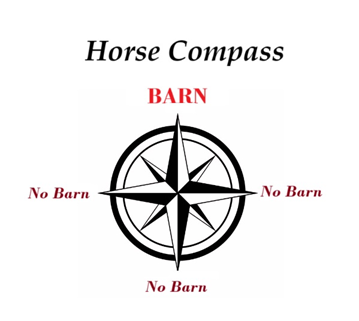In the last 10 to 15 years or so there has been a mystifying (to me) transfer/reversal of social dynamics on many fronts. That reverses decades of social assumptions that everyone thought were god-given nature, in the days those assumptions were the natural order. Across almost every aspect of American life, from personal to business to … everything else. Including horses!!!
I had also assumed that as public perceptions matured, public perceptions would enjoy the maturity and not regress – ever. Was I ever wrong about that. 
The one who has helped me by far the most – online, never seen him in person – is Carson James. On first look, his youth, lack of polish and production, and broad accent, came across to me as “what a yahoo”. But he is truly the real deal who has learned from the others before him, and addresses a very broad range of behavior down to the root.
His public videos are very trimmed. Seeing the membership-version full length ones – horse training isn’t quick! And the horse hasn’t read the script!  Carson is all about waiting for and then rewarding the tiny changes, and building. But – you get to see it in real life. And say ‘yeah that’s like my horse, ok this is what to try next, and how long it might take and how patient I need to be’.
Carson is all about waiting for and then rewarding the tiny changes, and building. But – you get to see it in real life. And say ‘yeah that’s like my horse, ok this is what to try next, and how long it might take and how patient I need to be’.
I think the more professionally produced trainers actually give an incorrect impression of how their methods work, in real life. The video shows results in 5, maybe 15 minutes – by assiduously trimming what happened in real life.
But if a follower trying the same method isn’t getting results in the first 5 to 10 minutes, they may conclude that their horse just isn’t getting this. Won’t get this. Something is wrong! And not the rider, because they are following what the video showed. Unfortunately they have a very incorrect expectation of youtube-length training, not IRL training.
Below, Carson wanderingly explains that ‘balking’ (he calls it ‘locking up’) is the root of a lot of other behaviors. Because pressing it can lead to explosions of rearing (“rarin” as he says), bucking, spooking, bolting, etc., a lot of things clicked for me. From there he addresses how to start at that root, from the ground (keeping the feet moving), to work toward a better citizen overall, on the ground and under saddle. He’s done videos that are equally helpful root-corrections of things like constantly speeding up, being difficult to slow down, etc.
His fixes are not immediate, he explains a progression. In one session and over multiple sessions. Especially for the membership who can see 10 long but progressive videos on training a specific behavior.
These two are greatly trimmed down for the public viewer to show progression … and if you aren’t into it, even these trimmed version are the definition of ‘long’ and ‘dry’! When is the horse going to learn … ???
Very helpful but not competitive with the productions of CA and Parelli. In one of these at least Carson is wearing his own brand shirt. His earliest ones – no branding to be seen. 
Early version – no branding – who is this guy??? 
https://www.youtube.com/watch?v=FafZ5vnwewI
Well at least he has a brand shirt on this time … still being himself …
https://www.youtube.com/watch?v=LWXacD-iJSo&t=1s
CJ videos really helped me learn how to identify tiny changes. And how to urge the wanted behavior by peacefully but insistently ‘bothering’ the unwanted behavior. And rewarding the wanted behavior. Carson got his start working on a Montana ranch, so much of this is from the tradition that informed Buck et. al. He does not claim ever that all of this is original to him. He’s just showing what works for specific issues.


 Carson is all about waiting for and then rewarding the tiny changes, and building. But – you get to see it in real life. And say ‘yeah that’s like my horse, ok this is what to try next, and how long it might take and how patient I need to be’.
Carson is all about waiting for and then rewarding the tiny changes, and building. But – you get to see it in real life. And say ‘yeah that’s like my horse, ok this is what to try next, and how long it might take and how patient I need to be’.

